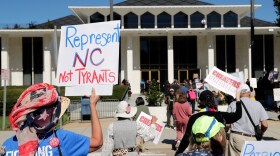North Carolina’s GOP-controlled legislature unlawfully tried to seize from the governor the power to choose election board members in the battleground state, trial judges ruled while saying portions of a new election law must be permanently blocked.
The three-judge panel sided unanimously with Democratic Gov. Roy Cooper in his lawsuit filed days after the GOP-controlled General Assembly overrode Cooper's veto of the measure in October. The changes, which had been set to take effect in January, would have shifted board appointment powers away from the governor and to the legislature.
In late November, the panel temporarily blocked the new structures for the State Board of Elections and boards in all 100 counties from taking effect while Cooper’s lawsuit was heard.
The judges agreed with Cooper's lawyers, who said that, based on recent court rulings and the state constitution, the new appointments process interferes with a governor's ability to ensure elections and voting laws are “faithfully executed."
It's clear the law “infringes upon the Governor’s constitutional duties” and actions by the GOP legislative leaders “are the most stark and blatant removal of appointment power from the Governor,” since state Supreme Court rulings in 2016 and 2018 that favored the state’s chief executive, Superior Court Judges Edwin Wilson, Andrew Womble and Lori Hamilton wrote in the order filed Monday. Hamilton and Womble are both registered Republicans, while Wilson is a Democrat.
The decision means these boards will remain under the previous law’s setup, unless it gets overturned on appeal. Republicans are encouraged by having won recent high-stakes rulings at the state Supreme Court since it flipped in early 2023 from a 4-3 Democratic majority to a 5-2 GOP majority.
The Associated Press sent emails Tuesday to the offices of Cooper and Senate leader Phil Berger seeking comment. House Speaker Tim Moore's office had no comment, a spokesperson said.
Cooper, who is term-limited from running again this year, has called the changes a power grab for the GOP entering a presidential election year. Rulings by these boards on where voting sites are located, which ballots are counted and if challenges of results are accepted could affect close races for governor, Congress and the legislature.
For several years, Republicans at the General Assembly have pushed unsuccessfully to alter the composition of the state board, which they've said would promote bipartisan consensus in elections and voting decisions. They have been thwarted both by court rulings and a constitutional amendment that voters rejected in 2018.
The ruling, dated last Friday, also has stalled further a key element of changes that they approved in 2023 and contend will build voter confidence in elections. They were among the most extensive state voting reforms passed last year and continue a trend among Republican state legislatures, many of which have passed laws since 2021 adding new voting restrictions. Those laws have come after former President Donald Trump began falsely claiming that widespread fraud cost him reelection in 2020.
The state elections board has five members appointed by the governor — a format going back over 100 years — from candidate lists provided by the major parties. The governor’s party holds three of the seats.
The challenged Republican proposal would have increased the board to eight members appointed by the General Assembly based on recommendations of top legislative leaders from both parties — likely leading to a 4-4 split among Democrats and Republicans. Four-member county boards also would be picked through legislative leaders’ choices. Currently, county boards are five members, with state board members naming four positions and Cooper one.
Cooper and his Democratic allies have argued these formats will lead to deadlocks that could mean fewer early in-person voting sites and more contested election results being decided by the General Assembly.
Should the board changes be upheld by courts in the coming months, new appointments could happen as general election campaigning heats up and voting approaches.
Other new election changes applying to voters in this week's primary elections directed that mailed ballots received after Tuesday weren't counted, eliminating the previous three-day grace period for ballots postmarked by the day of the election. And many voters had to show a photo identification to vote for the first time, the result of a 2018 law whose implementation had been delayed by lawsuits.
The elections board lawsuit is one of many that Cooper has filed over the past seven years challenging General Assembly laws that he argues unlawfully weakens his position. Last week, a separate three-judge panel agreed to block appointment alterations made by the legislature to two boards and commissions but allowed changes to five others to continue. Republican legislators plan to appeal that ruling.






